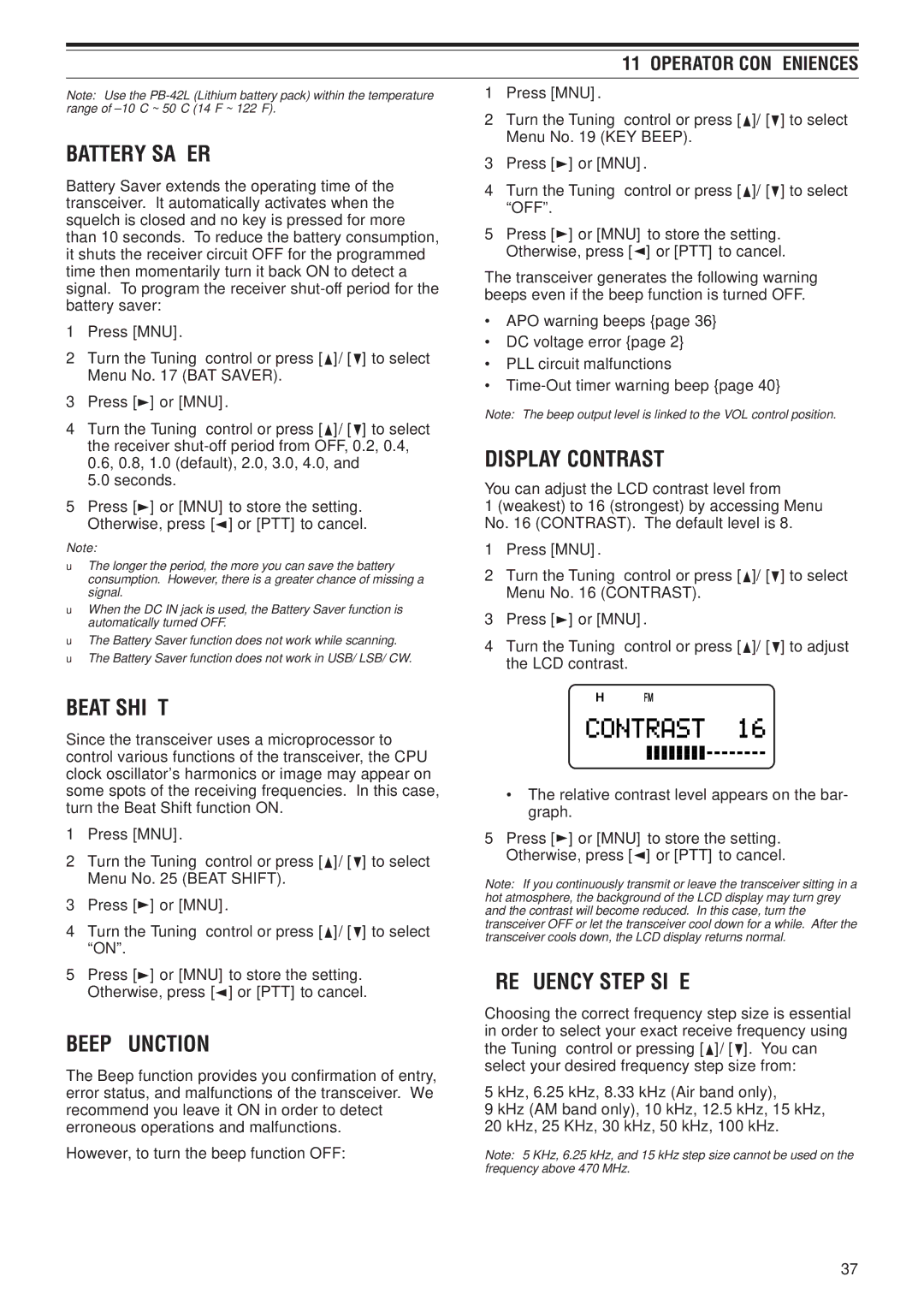
11 OPERATOR CONVENIENCES
Note: Use the
BATTERY SAVER
Battery Saver extends the operating time of the transceiver. It automatically activates when the squelch is closed and no key is pressed for more than 10 seconds. To reduce the battery consumption, it shuts the receiver circuit OFF for the programmed time then momentarily turn it back ON to detect a signal. To program the receiver
1Press [MNU].
2Turn the Tuning control or press [![]() ]/ [
]/ [![]() ] to select Menu No. 17 (BAT SAVER).
] to select Menu No. 17 (BAT SAVER).
3Press [![]() ] or [MNU].
] or [MNU].
4Turn the Tuning control or press [![]() ]/ [
]/ [![]() ] to select the receiver
] to select the receiver
5.0 seconds.
5Press [![]() ] or [MNU] to store the setting. Otherwise, press [
] or [MNU] to store the setting. Otherwise, press [![]() ] or [PTT] to cancel.
] or [PTT] to cancel.
Note:
◆The longer the period, the more you can save the battery consumption. However, there is a greater chance of missing a signal.
◆When the DC IN jack is used, the Battery Saver function is automatically turned OFF.
◆The Battery Saver function does not work while scanning.
◆The Battery Saver function does not work in USB/ LSB/ CW.
1Press [MNU].
2Turn the Tuning control or press [![]() ]/ [
]/ [![]() ] to select Menu No. 19 (KEY BEEP).
] to select Menu No. 19 (KEY BEEP).
3Press [![]() ] or [MNU].
] or [MNU].
4Turn the Tuning control or press [![]() ]/ [
]/ [![]() ] to select “OFF”.
] to select “OFF”.
5Press [![]() ] or [MNU] to store the setting. Otherwise, press [
] or [MNU] to store the setting. Otherwise, press [![]() ] or [PTT] to cancel.
] or [PTT] to cancel.
The transceiver generates the following warning beeps even if the beep function is turned OFF.
•APO warning beeps {page 36}
•DC voltage error {page 2}
•PLL circuit malfunctions
•
Note: The beep output level is linked to the VOL control position.
DISPLAY CONTRAST
You can adjust the LCD contrast level from
1 (weakest) to 16 (strongest) by accessing Menu No. 16 (CONTRAST). The default level is 8.
1Press [MNU].
2Turn the Tuning control or press [![]() ]/ [
]/ [![]() ] to select Menu No. 16 (CONTRAST).
] to select Menu No. 16 (CONTRAST).
3Press [![]() ] or [MNU].
] or [MNU].
4Turn the Tuning control or press [![]() ]/ [
]/ [![]() ] to adjust the LCD contrast.
] to adjust the LCD contrast.
BEAT SHIFT
Since the transceiver uses a microprocessor to control various functions of the transceiver, the CPU clock oscillator’s harmonics or image may appear on some spots of the receiving frequencies. In this case, turn the Beat Shift function ON.
1Press [MNU].
2Turn the Tuning control or press [![]() ]/ [
]/ [![]() ] to select Menu No. 25 (BEAT SHIFT).
] to select Menu No. 25 (BEAT SHIFT).
3Press [![]() ] or [MNU].
] or [MNU].
4Turn the Tuning control or press [![]() ]/ [
]/ [![]() ] to select “ON”.
] to select “ON”.
5Press [![]() ] or [MNU] to store the setting. Otherwise, press [
] or [MNU] to store the setting. Otherwise, press [![]() ] or [PTT] to cancel.
] or [PTT] to cancel.
BEEP FUNCTION
The Beep function provides you confirmation of entry, error status, and malfunctions of the transceiver. We recommend you leave it ON in order to detect erroneous operations and malfunctions.
However, to turn the beep function OFF:
•The relative contrast level appears on the bar- graph.
5Press [![]() ] or [MNU] to store the setting. Otherwise, press [
] or [MNU] to store the setting. Otherwise, press [![]() ] or [PTT] to cancel.
] or [PTT] to cancel.
Note: If you continuously transmit or leave the transceiver sitting in a hot atmosphere, the background of the LCD display may turn grey and the contrast will become reduced. In this case, turn the transceiver OFF or let the transceiver cool down for a while. After the transceiver cools down, the LCD display returns normal.
FREQUENCY STEP SIZE
Choosing the correct frequency step size is essential in order to select your exact receive frequency using the Tuning control or pressing [![]() ]/ [
]/ [![]() ]. You can select your desired frequency step size from:
]. You can select your desired frequency step size from:
5 kHz, 6.25 kHz, 8.33 kHz (Air band only),
9 kHz (AM band only), 10 kHz, 12.5 kHz, 15 kHz, 20 kHz, 25 KHz, 30 kHz, 50 kHz, 100 kHz.
Note: 5 KHz, 6.25 kHz, and 15 kHz step size cannot be used on the frequency above 470 MHz.
37
